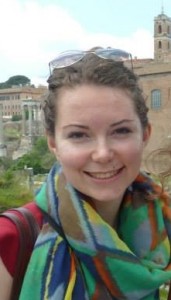This post was contributed by Emily Williams, a PhD student studying Humanities and Cultural Studies in Birkbeck’s School of Arts.
Yesterday was World Teachers’ Day and this annual celebration of such an important profession has made me reflect on my own teaching experiences. This spring I gave six 40-minute tutorials to two groups of six Year 9 and 10 pupils (aged 14 and 15) from Eastbury Comprehensive School in east London. The placement was arranged by The Brilliant Club – an award-winning non-profit organisation that exists to widen access to top universities for outstanding pupils from non-selective state schools.
Teaching my first lesson about propaganda posters in Mao Zedong’s China was a daunting experience. I had planned a relatively complex discussion of the term ‘propaganda’ and had no idea what to expect from the students. Would they pay attention? Would they participate? Thankfully, they were switched on and engaged, making thoughtful comments and participating eagerly. I think they particularly enjoyed the anti-Nazi Disney film we watched, featuring Donald Duck in Nazi Germany!
In subsequent lessons we moved on to looking at Maoist China, and while I know they found this section difficult, I was impressed with how quickly they grasped the major historical events that we covered. Where they really started to shine, however, was when we moved on to visual analysis of the posters. One of my major aims was to teach them that there isn’t a right answer for everything. So often, our education system seems to focus on exam preparation, with its attendant narrow conceptions of knowledge. With visual analysis, there was no right answer – I was genuinely interested in how they saw the posters. Some students couldn’t shake themselves out of their normal learning patterns and just wrote what they thought I wanted to read, but a few students really got creative, and came up with some really interesting observations, looking at gender positioning in the posters, or rhetorical strategies for dealing with enemies.
The course was seriously challenging – forcing pupils to think critically about the concept of propaganda, develop an understanding of the history of Mao’s China, and carry out visual analysis on so-called propaganda posters. On top of that, they also had to grapple with a tailor-made online platform, which gave each pupil their own space to gather research in preparation for their final assignment.
Most of my students were already planning on going to university, but I hope my course gave them a further glimpse of both their own potential and the sorts of learning and research they can undertake. At our Brilliant Club graduation ceremony in Oxford, it was clear that the students were proud of their work, and I hope many of them gained in confidence as a result.
I think working with young people is really important for academics. My personal research looks at China, a country often misunderstood and misconstrued in the media and popular culture. While what can be accomplished in six short lessons is limited, I hope that I have raised their interest in China, and also helped them think more critically about how information is communicated and perceptions are shaped. We were looking at posters from Mao’s China, but the lessons about rhetoric and persuasion apply just as much to understanding advertising and the media today. I think academics can also benefit from this sort of work, both from having to learn to communicate our research more clearly and simply, but also from the insights young people can provide. A colleague of mine told me the whole frame of his thesis came into focus based on one observation by a student.
Working with Brilliant Club was time-consuming, but I think also has a lot of benefits. For many PhD students, this will be our only chance to design a course, and this (I hope!) will help us in job applications in the future. It’s also a chance to remember why we’re in education in the first place: the production of knowledge is our central concern, but for me, the opportunity to communicate this knowledge to new audiences is just as important.
. Reply . Category: Arts, Higher education . Tags: China, Mao Zedong, propaganda

